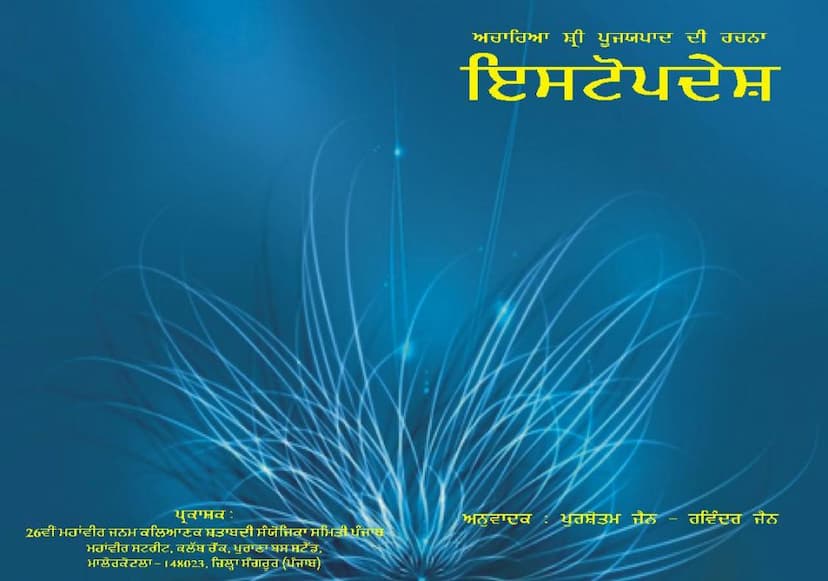Ishtopdesh
Added to library: September 1, 2025

Summary
This document is a Punjabi translation of Acharya Shri Pujyapada's Ishtopadesha, a short but significant Jain text consisting of 51 verses. The translation is by Purshottam Jain and Ravindra Jain and published by the 26th Mahavir Janam Kalyanak Shattabadi Sanjojika Samiti, Punjab.
The introduction on page 3 highlights Acharya Pujyapada as a prominent figure in the Digambara Jain tradition, who lived in the 5th century CE. He was known for his vast intellect, earning the name Jinendra Buddhi, and later Pujyapada as his wisdom was worshipped by gods. His work shows the influence of earlier scholars like Kudakunda and Sumantabhadra. Pujyapada was a polymath, writing on grammar, prosody, scriptures, and medicine. Ishtopadesha, along with Jinendra Vyakarana, Sarvartha Siddhi, and Samadhi Tantra, are among his acclaimed works.
Ishtopadesha, with its 51 verses, is presented as a guide that lovingly draws attention to the need for spirituality and self-contemplation in life. The text emphasizes a clear distinction between what is one's own and what is not, and what is essential versus non-essential. The fundamental principle highlighted is the understanding of the soul (Jiva) and matter (Pudgala) as distinct entities, with all other worldly matters being mere extensions of these two. The translators position this work as an important spiritual text in an era of materialistic pursuits, teaching the art of the soul becoming divine.
The publishers express their gratitude for the blessings received from various spiritual figures, including Sadhvi Shri Sudha Ji Maharaj and Muni Shri Jai Chand Ji, in bringing this Punjabi translation to fruition. They apologize for any errors and hope readers will benefit from the text.
The core message of Ishtopadesha, as presented in the translated verses, can be summarized as follows:
-
The Nature of the Soul and Reality:
- The highest state is that of a Tirthankara who has shed all karma and attained their inherent soul nature.
- Sensory pleasures are fleeting and can cause suffering, especially during difficult times.
- Just as gold can be refined with the right process, the soul can attain divinity through self-knowledge and proper understanding of self-principles (self-substance, place, time, and disposition).
- Ignorance (Moh) obscures true knowledge, much like intoxication clouds judgment.
- The fundamental truth is the distinction between the soul and matter. Everything else is secondary.
-
The Path to Liberation (Moksha):
- Practicing vows (vratas) leads to heaven, while neglecting them leads to hell. The difference is as stark as shade versus sunlight.
- Attachment to the body, home, family, friends, and even enemies is ultimately superficial, as they are temporary.
- The powers that lead to liberation are far greater than those that merely grant heavenly pleasures.
- The soul is eternal, self-aware, and capable of infinite bliss. The goal is to realize this inner reality.
- One must withdraw senses from external objects and focus the mind inwards, meditating on the soul through the soul.
-
Critique of Worldly Attachments and Illusions:
- Worldly possessions are insecure and perishable, and seeking happiness in them is like trying to drink ghee while suffering from a fever.
- Ignorant individuals are unaware of their own troubles, much like a person sitting on a tree in a burning forest, observing the plight of others.
- Wealth is often valued more than life itself, despite the understanding that its accumulation is dependent on time.
- Seeking wealth for charity is like smearing oneself with mud in anticipation of a bath.
- Sensual pleasures cause initial distress, increase craving, and are difficult to renounce, making them undesirable for the wise.
- The perishable body, even when associated with pure substances, can render them impure. Therefore, desiring such a transient body is illogical.
- True well-being comes from benefiting the soul, not the body. Those who focus on the body's welfare cannot benefit their soul.
- The world appears as an illusion (like magic) when one attains true knowledge. Any deviation of the mind from self-contemplation at this stage leads to suffering.
- The joy of self-contemplation is described as a fire that burns away karmic impurities and protects the yogi from external sufferings.
-
The Nature of Knowledge and the Guru:
- Worshipping ignorance yields ignorance, while worshipping knowledge yields knowledge.
- While external factors like gurus can be instrumental, the true realization of the soul comes from within the soul itself. The soul is its own guru.
- One who understands the difference between self and non-self through spiritual teachings and practice truly comprehends the bliss of liberation.
-
The Ideal State of the Yogi:
- A yogi in deep contemplation does not get entangled in questions of "what is this?", "whose is this?", "how is this?", "where is this?", or "for what reason?". They lose awareness of their physical body.
- A person absorbed in the soul is like someone content in their own place, not seeking other locations. They may appear ignorant of external matters, but this does not bind them to karma; rather, it leads to liberation.
- Wise and pure individuals who read Ishtopadesha cultivate equanimity amidst honor and dishonor, ultimately attaining liberation.
- True contentment comes from the soul, not from external objects. Great souls strive to realize the soul.
- Good people prefer solitude and are self-sufficient. They are absorbed in their inner self, and even when speaking or acting, they remain inwardly detached.
In essence, Ishtopadesha is a profound spiritual discourse that guides the seeker towards self-realization by emphasizing detachment from worldly illusions, the practice of introspection and meditation, and the understanding of the soul as the ultimate source of bliss and liberation.